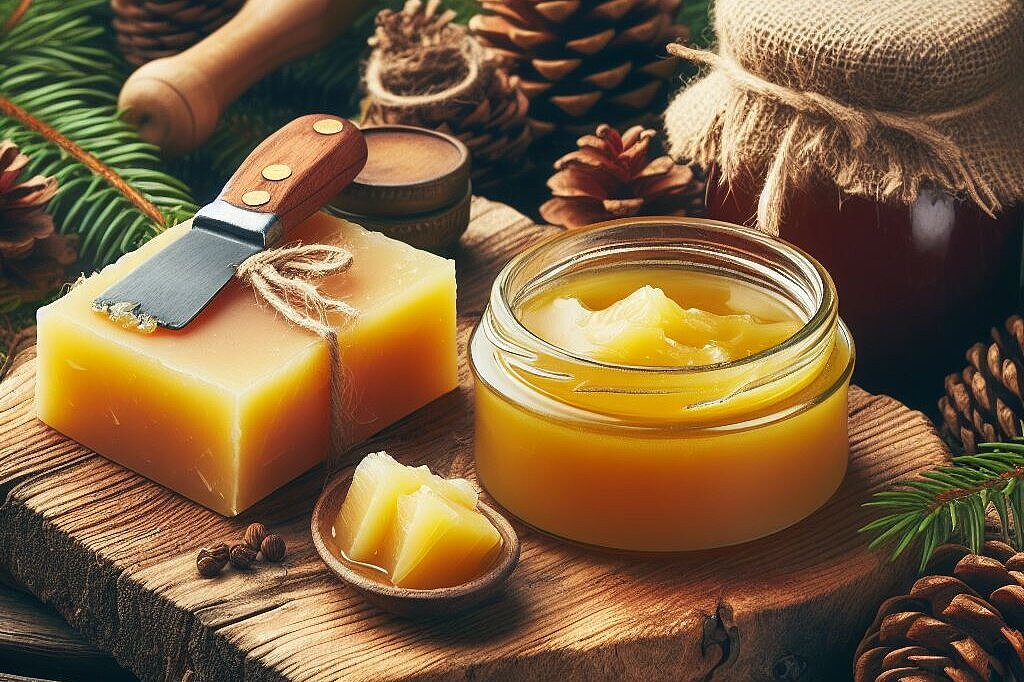Jojoba wax

In the constant search for natural and effective care products for our four-legged friends, we keep coming across jojoba wax. This product, obtained from the seeds of the jojoba bush, is already an established ingredient in human cosmetics. But what about its use on dogs? This article looks at the potential of jojoba wax for dog grooming by examining its properties, benefits and possible drawbacks in detail.
What is jojoba wax?
Jojoba wax, often referred to as jojoba oil, is a product extracted from the seeds of the jojoba shrub(Simmondsia chinensis). Although it is commonly referred to as an oil, it is actually a liquid wax that is a clear, golden liquid at room temperature. It is characterized by its chemical stability and long shelf life, which makes it a popular ingredient in the cosmetics industry.
Benefits of jojoba wax for dogs
Excellent skin and coat care
Jojoba wax is known for its moisturizing properties. It can help to nourish and hydrate your dog's skin, which is particularly beneficial for dogs with dry or irritated skin. It can also give the coat a healthy shine without leaving a greasy residue.
Natural and safe
Compared to many chemical grooming products, jojoba wax is a natural alternative that is free from harmful additives. When used externally, it is considered safe for dogs as long as it is used in appropriate amounts.
Supporting wound healing
Due to its antimicrobial properties, jojoba wax can help heal minor skin injuries or tears. It forms a protective layer that prevents the penetration of bacteria and at the same time promotes the natural regeneration of the skin.
Possible disadvantages and precautions
Risk of internal absorption
While jojoba wax is safe for external use, internal ingestion, for example by licking, can lead to digestive problems. It is important to ensure that your dog does not ingest the wax in large quantities.
Allergic reactions
Although allergic reactions to jojoba wax are rare, they cannot be completely ruled out. It is advisable to look out for signs of allergy such as redness, swelling or itching when using it for the first time.
Application tips
To use jojoba wax safely on your dog, you should observe the following instructions:
- Test application: First carry out a small test application on a limited area of skin to rule out possible allergic reactions.
- Purity: Make sure to use pure jojoba wax without additives to minimize the risk of skin irritation.
- Moderate use: Excessive use can lead to a greasy coat. A few drops are usually sufficient.
Jojoba wax can be a valuable addition to your dog's grooming routine. Its natural moisturizing and healing properties make it a safe choice for external use. However, as with any grooming product, careful application and observation is necessary to ensure that your dog reacts positively to it. With the right precautions and responsible application, jojoba wax can help to promote the well-being and health of your four-legged friend.
If you notice any signs of hypersensitivity or poisoning in your dog, you should see your vet immediately. We are not a substitute for a vet, but we try to be as accurate as possible. Every dog reacts differently and we recommend you get a second opinion or consult your vet if in doubt.
Stay healthy and take good care of your four-legged friend!😊
Similar to Jojoba wax
Beeswax is the secretion of four pairs of wax glands on the abdomen of bees. The bees chew the wax softly and use it to form the hexagonal cells of their honeycombs. In these cells they store honey...
Copernicia Cerifera Cera is the Latin name for carnauba wax, which is obtained from the excretions of the leaves of the carnauba palm (Copernicia prunifera). The palm produces a powdery layer of wax...
Paw wax is a product designed to protect and care for dogs' paws. Dogs' paws are very sensitive and can be damaged by various factors, such as Irritating substances such as road salt, fertilizers...
Shea butter is obtained from the nuts of the shea tree, which grows mainly in the savannahs of West Africa. It is known for its rich fatty acids, vitamins (especially vitamin E) and minerals. This...



